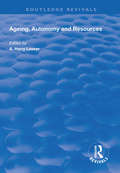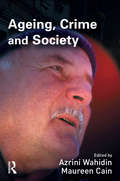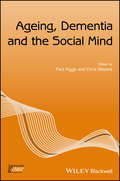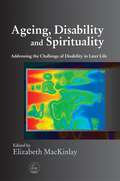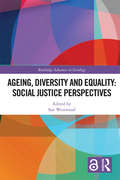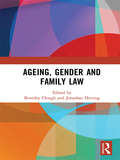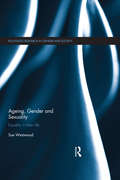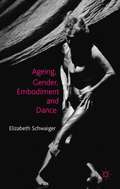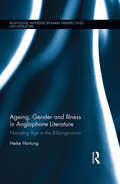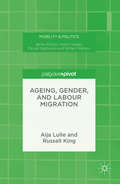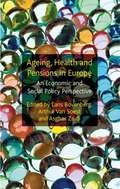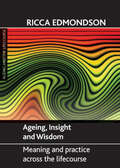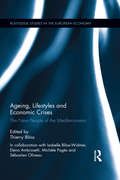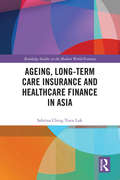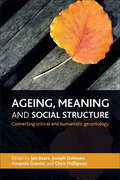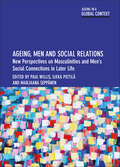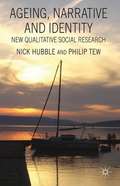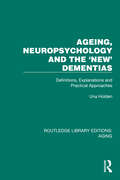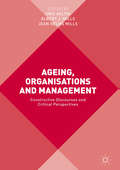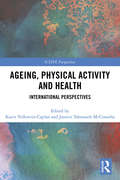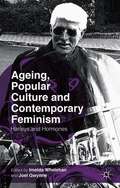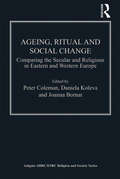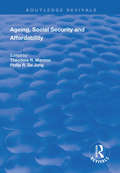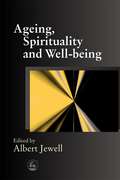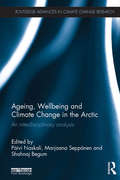- Table View
- List View
Ageing, Autonomy and Resources (Routledge Revivals)
by A. Harry LesserFirst Published in 1999, lesser collects fourteen papers to create a discourse on the practical importance in a society where the proportion of elderly people is increasing. Exploring how autonomy and how it should be defined, and ethically when is it right to preserve a person’s autonomy and in comparison is it ever ethically right to bring elderly peoples autonomy as a secondary concern is it saves them from harm?
Ageing, Crime and Society
by Azrini Wahidin Maureen CainThe relationship between ageing and crime has been a much neglected issue, the focus rather being on youth. This books aims to redress this imbalance, bringing together a group of leading authorities to address key issues on the subject of crime and ageing, considering older people as both victims and perpetrators of crime, and looking too at conditions faced by older prisoners. The book draws upon both criminology and gerontology, as well as sociology and social policy, to help understand the complex relationship between ageing and the criminal justice system, and argues that the needs of elders must be far more firmly on the penal policy agenda than is the case currently. Ageing, Crime and Society will be concerned with 'unsilencing' a group who because of their age and status have been muted by the criminal justice system.
Ageing, Dementia and the Social Mind (Sociology of Health and Illness Monographs)
by Chris Gilleard Paul HiggsA groundbreaking exploration of the sociology of dementia — with contributions from distinguished international scholars and practitioners. Organised around the four themes of personhood, care, social representations and social differentiation Provides a critical look at dementia and demonstrates how sociology and other disciplines can help us understand its social context as well as the challenges it poses Contributing authors explore the social terrain, responding in part, to Paul Higgs’ and Chris Gilleard’s highly influential work on ageing Breaks new ground in giving specific attention to the social and cultural dimensions of responses to dementia
Ageing, Disability and Spirituality: Addressing the Challenge of Disability in Later Life
by Elizabeth Mackinlay Christine Bryden Dagmar Ceramidas Eileen Mary Glass Matthew AnsteyThis collection examines theological and ethical issues of ageing, disability and spirituality, with an emphasis on how ageing affects people who have mental health and developmental disabilities. The book presents ways of moving towards more effective relationships between carers and older people with disabilities; ways in which to connect compassionately and beneficially with the person's spiritual dimension. The contributors highlight the importance of recognizing the personhood of all people regardless of age and of disability, whatever form it takes. They identify factors inherent in personhood and provide ways of affirming and promoting spiritual well-being for older people with disabilities. Valuable reading for practitioners in aged care, healthcare, chaplaincy, social and pastoral care, and diversional therapists, this book will also be of interest to older people, their families and friends.
Ageing, Diversity and Equality: Social Justice Perspectives (Routledge Advances in Sociology)
by Sue WestwoodCurrent understandings of ageing and diversity are impoverished in three main ways. Firstly, with regards to thinking about what inequalities operate in later life there has been an excessive preoccupation with economic resources. On the other hand, less attention has been paid to cultural norms and values, other resources, wider social processes, political participation and community engagement. Secondly, in terms of thinking about the ‘who’ of inequality, this has so far been limited to a very narrow range of minority populations. Finally, when considering the ‘how’ of inequality, social gerontology’s theoretical analyses remain under-developed. The overall effect of these issues is that social gerontology remains deeply embedded in normative assumptions which serve to exclude a wide range of older people. Ageing, Diversity and Equality aims to challenge and provoke the above described normativity and offer an alternative approach which highlights the heterogeneity and diversity of ageing, associated inequalities and their intersections. The Open Access version of this book, available at https://www.taylorfrancis.com/books/9781351851329, has been made available under a Creative Commons Attribution-Non Commercial-No Derivatives 4.0 licence.
Ageing, Gender and Family Law
by Jonathan Herring Beverley CloughThis book explores the intersecting issues relating the phenomenon of ageing to gender and family law. The latter has tended to focus mainly on family life in young and middle age; and, indeed, the issues of childhood and parenting are key in many family law texts. Family life for older members has, then, been largely neglected; addressing this neglect, the current volume explores how the issues which might be important for younger people are not necessarily the same as those for older people. The significance of family, the nature of family life, and the understanding of self in terms of one’s relationships, tend to change over the life course. For example, the state may play an increasing role in the lives of older people – as access to services, involvement in work and the community, the ability to live independently, and to form or maintain caring relationships, are all impacted by law and policy. This collection therefore challenges the standard models of family life and family law that have been developed within a child/parent-centred paradigm, and which may require rethinking in the turn to family life in old age. Interdisciplinary in its scope and orientation, this book will appeal not just to academic family lawyers and students interested in issues around family law, ageing, gender, and care; but also to sociologists and ethicists working in these areas.
Ageing, Gender and Sexuality: Equality in Later Life (Routledge Research in Gender and Society)
by Sue WestwoodAgeing, Gender and Sexuality focuses on the experiences of older lesbian, gay and bisexual (LGB) individuals, in order to analyse how ageing, gender and sexuality intersect to produce particular inequalities relating to resources, recognition and representation in later life. The book adopts a feminist socio-legal perspective to propose that these inequalities are informed by and play out in relation to temporal, spatial and regulatory contexts. Discussing topics such as ageing sexual subjectivities, ageing kinship formations, classed trajectories and anticipated care futures, this book provides a new perspective on older individuals in same-sex relationships, including those who choose not to label their sexualities. Drawing upon recent empirical data, the book offers new theoretical approaches for understanding the intersectionality of ageing, gender and sexuality, as well as analysing the social policy implications of these findings. With an emphasis on the accounts of individuals who have experienced the dramatically changing socio-legal landscape for LGB people first-hand, this book is essential reading for students, scholars and policymakers working in the areas of: gender and sexuality studies; ageing studies and gerontology; gender, sexuality and law; equality and human rights; sociology; socio-legal studies; and social policy. Ageing, Gender and Sexuality won the Socio-Legal Studies Association (SLSA) Hart Prize for Early Career Academics for 2017.
Ageing, Gender, Embodiment and Dance
by Elisabeth SchwaigerThis book explores the nexus between gender, ageing and culture in dancers practicing a variety of genres. It challenges existing cultural norms which equate ageing with bodily decline and draws on an interdisciplinary theoretical framework to explore alternatives for developing a culturally valued mature subjectivity through the practice of dance.
Ageing, Gender, and Illness in Anglophone Literature: Narrating Age in the Bildungsroman (Routledge Interdisciplinary Perspectives on Literature)
by Heike HartungThis study establishes age as a category of literary history, delineating age in its interaction with gender and narrative genre. Based on the historical premise that the view of ageing as a burden emerges as a specific narrative in the late eighteenth century, the study highlights how the changing experience of ageing is shaped by that of gender. By reading the Bildungsroman as a 'coming of age' novel, the book asks how the telling of a life in time affects individual age narratives. Bringing together the different perspectives of age and disability studies, the book argues that illness is already an important issue in the Bildungsroman's narratives of ageing. This theoretical stance provides new interpretations of canonical novels, visiting authors such as Johann Wolfgang Goethe, Frances Burney, Maria Edgeworth, Jane Austen, Charles Dickens, George Eliot, Samuel Beckett, and Jonathan Franzen. Drawing on the link between age and illness in the Bildungsroman's age narratives, the genre of 'dementia narrative' is presented as one of the directions which the Bildungsroman takes after its classical period. Applying these theoretical perspectives to canonical novels of the nineteenth century and to the new genre of 'dementia narrative', the volume also provides new insights into literary and genre history. This book introduces a new theoretical approach to cultural age studies and offers a comprehensive analysis of the connection between narratology, literary theory, gender and age studies.
Ageing, Gender, and Labour Migration (Mobility & Politics)
by Russell King Aija LulleThis book explores how the real conditions and subjective conceptions of ageing and well-being are transformed when people move from one country to another. Focusing on ageing female migrants from Latvia in the UK and other European countries, this book is based on fifty life-history interviews with women aged 40s-60s. Empirical chapters concentrate on functional well-being in migration, which includes access to the economic citizenship of work, income, pensions, and accommodation, and on psychosocial well-being, and explores Latvian women's experiences of intimate citizenship in migration. In addition, the authors' research challenges the trope of vulnerability which generally surrounds the framing of older migrants' lives. The study's findings offer policy-makers insights into the realities of ageing working migrants and advocates for a more inclusive transnational citizenship, better working conditions, and ongoing care arrangements for older migrants post-retirement, either abroad or back home.
Ageing, Health and Pensions in Europe
by Lans BovenbergProviding an overview of the future research challenges for economists and social scientists concerning population ageing, pensions, health and social care in Europe, this book examines how scientific research can provide cutting-edge evidence on income security and well-being of the elderly, and labour markets and older workers.
Ageing, Insight and Wisdom: Meaning and Practice across the Lifecourse (Ageing and the Lifecourse)
by Ricca EdmondsonThis book focuses on older people as makers of meaning and insight, highlighting the evolving values, priorities and ways of communicating that make later life fascinating. It explores what creating ‘meaning’ in later life really implies, for older people themselves, for how to conceptualise older people and for relationships between generations. The book offers a language for discussing major types of lifecourse meaning, not least those concerning ethical and temporal aspects of the ways people interpret their lifecourses, the ways older people form part of social and symbolic landscapes, and the types of wisdom they can offer. It will appeal to students of gerontology, sociological methodology, humanistic sociology, philosophy, psychology, and health promotion and medicine.
Ageing, Lifestyles and Economic Crises: The New People of the Mediterranean (Routledge Studies in the European Economy)
by Elena Ambrosetti Isabelle Blöss-Widmer Michèle Pagès Sébastien OliveauNo society can escape population ageing. This demographic phenomenon has profound social consequences on the lifestyles of individuals and societies. In the light of the accelerated ageing of the Mediterranean area, the analyses which inform this work aim to understand how the age-related policies of Nation-States are partly responsible for the behaviours of the generations. They also highlight how the lifestyle changes are the result of trends which are common to these societies. The Mediterranean area constructed here by the researchers offers an in-depth reflection on the national cases presented, in terms of their specificities or societal singularities, as well as of their dynamics of convergence. Drawing on empirical research in sociology, demography, geography and economics, exploiting the most recent data available and setting the present in historical perspective, Ageing, Lifestyles and Economic Crises studies Mediterranean societies in relation to three major challenges which they now confront. These are: population ageing and its implications in terms of intergenerational family support relationships; increasingly insecure adult professional trajectories and their consequences for the evolution of social gender roles, in an economic context commonly referred to as a 'crisis'; and lastly the role of Nation-States' public policies in the social reproduction of these gender inequalities. These three issues are the keystone to understanding the ongoing transformations in the lifestyles and life cycles of Mediterranean societies. This volume marshals a wealth of recent data that will be useful not only to many academics and scientists but also to local and national policy-makers.
Ageing, Long-term Care Insurance and Healthcare Finance in Asia (Routledge Studies in the Modern World Economy)
by Sabrina Ching LukThis book uses a revised version of Kingdon’s multiple-streams framework to examine health financing reforms in China, Hong Kong, Taiwan, and the Republic of Korea (ROK) as well as long-term care insurance (LTCI) reforms in Japan and Singapore. It shows that the explanatory power of the multiple-streams framework can be strengthened through enriching the concepts of policy entrepreneurs, ideas, and windows of opportunity in the original framework as well as bringing the theoretical lens of historical institutionalism into the framework.
Ageing, Meaning and Social Structure: Connecting Critical and Humanistic Gerontology
by Edited by Jan Baars, Joseph Dohmen, Amanda Grenier and Chris PhillipsonAgeing, meaning and social structure is a unique book advancing critical discourse in gerontology and makes a major contribution to understanding key social and ethical dilemmas facing ageing societies. It confronts and integrates approaches that have been relatively isolated from each other, and interrelates two major streams of thought within critical gerontology: analyses of structural issues in the context of political economy and humanistic perspectives on issues of existential meaning. The chapters, from a wide range of contributors, focus on major issues in ageing such as autonomy, agency, frailty, lifestyle, social isolation, dementia and professional challenges in social work and participatory research. This volume should be valuable reading for scholars and graduate students in gerontology and humanistic studies, as well as for policy makers and practitioners working in the field of ageing.
Ageing, Men and Social Relations: New Perspectives on Masculinities and Men’s Social Connections in Later Life
by Paul Willis, Ilkka Pietilä and Marjaana SeppänenWhile there has been a gradual increase in scholarship on men, ageing and masculinities, little attention has been paid to the social relations of men in later life and the implications for enhancing their social wellbeing and counteracting ageist discourse. Bringing together scholars in social gerontology and the social sciences from across Global North and South nations, this collection fills the gaps in key texts by foregrounding older men’s experiences. It provides new perspectives across the intersections of old age, ethnicities, class and sexual and gender identity, paying particular attention to older men from seldom heard or marginalised groups.
Ageing, Narrative and Identity
by Philip Tew Nick HubbleThis book outlines the methodology and results of the Fiction and the Cultural Mediation of Ageing Project, led by a research team from Brunel University, UK. It investigates how older people resist stereotypical cultural representations of ageing and demonstrates the importance of narrative understanding to social agency.
Ageing, Neuropsychology and the 'New' Dementias: Definitions, Explanations and Practical Approaches (Routledge Library Editions: Aging)
by Una HoldenUp to the 1990s, the influence of brain function disturbances and causes of dementia in the elderly had mostly been overlooked as a possible explanation for antisocial or unusual behaviour. As a result, these had tended not to be included in assessment and training programmes.
Ageing, Organisations and Management: Constructive Discourses and Critical Perspectives
by Iiris Aaltio Albert J. Mills Jean Helms MillsThis book explores critical perspectives on ageing in organisations and offers both managerial and workplace practices for dealing with this prominent issue. The collection provides cross-disciplinary research on the discursive and mythological aspects of ageing at work as well as recent studies of the relationship between age and innovation, talent, careers, and workplace transitions. The book brings together authors from Europe, North America and Australia. By addressing current societal challenges and offering insights on ageing at work, this book will be of interest to those involved in human resource management, workplace organisation and the sociology of work.
Ageing, Physical Activity and Health: International Perspectives (ICSSPE Perspectives)
by Karin Volkwein-Caplan Jasmin Tahmaseb McConathaOne of the most pressing questions facing society today is how to care for its burgeoning elderly population. By the year 2050, experts predict that one-third of the world’s population will be over 60 years old. Health promotion for the elderly is therefore becoming an increasingly important topic in public policy and planning. This book examines the challenges presented by an ageing global population, our varying expectations of healthy ageing, and the importance of exercise and physical activity for the elderly. Drawing on empirical research from around the world, it considers the factors that influence health and well-being in later life and compares practices and policies designed to promote healthy ageing. It presents case studies from 15 countries spanning Europe, North and South America, Africa and Asia, and sheds light on how attitudes to physical activity differ across nations, regions and cultures. Ageing, Physical Activity and Health: International Perspectives is important reading for all students, researchers and practitioners with an interest in physical activity, public health, exercise science or gerontology.
Ageing, Popular Culture And Contemporary Feminism
by Imelda Whelehan Joel GwynneHow has popular film, television and fiction responded to the realities of an ageing Western population? This volume analyses this field of representation to argue that, while celebrations of ageing as an inspirational journey are increasing, most depictions still focus on decline and deterioration.
Ageing, Ritual and Social Change: Comparing the Secular and Religious in Eastern and Western Europe (AHRC/ESRC Religion and Society Series)
by Daniela KolevaExploring European changes in religious and secular beliefs and practices related to life passages, this book provides a deeper understanding of the impacts of social change on personal identity and adjustment across the life course, According to latest research, Europeans who consider religious services appropriate to mark life passages significantly outnumber those who declare themselves as believers. Drawing on fascinating oral histories of older people's memories in both Eastern and Western Europe, this book presents illuminating views on peoples' quests for existential meaning in later life. Ageing, Ritual and Social Change presents an invaluable resource for all those exploring issues of ageing, including those looking from perspectives of sociology and psychology of religion, social and oral history and East-Central European studies.
Ageing, Social Security and Affordability (Routledge Revivals)
by Theodore R. Marmor Philip R. De JongFirst published in 1998. This volume (the second of a twin set grouping articles based on papers presented at seminars in Sigtuna, Sweden, during 1994 – 1996) deals with the largest spending programs of the welfare state – old age pensions and medical care, and their place within debates about the desirability and affordability of modern social programs. The volume is divided into four parts. The first part deals with general welfare state issues, cross-cutting themes and characterizations of whole systems within such diverse disciplines as social law, sociology and economics. Part two deals with old age pension reform. The countries discussed have widely different geographical, cultural and historical backgrounds. Part three takes up a number of interesting topics under the heading of health care reform. Part four deals with a substantial issue located and the juncture of aging, affordability, pensions and especially health care: increased longevity (and population aging) and the associated disability and frailty. What effect will these have on the future of modern welfare states?
Ageing, Spirituality and Well-being
by Malcolm Goldsmith Albert Jewell Elizabeth Mackinlay Rosalie Hudson'This publication brings together plenary addresses and other papers originally present at the Second International Conference on Ageing, Spirituality and Well-Being. The contributions are compassionate, warm and humane. The book is often insightful, frequently surprising, and can, without hesitation, be recommended as an introductory text to undergraduate nurses who wish to pursue those themes so ably captured by the title.' - Nursing Philosophy 'This is a timely book, appearing when those in the medical profession are beginning to accept that the spiritual and religious needs of people, and in particular older people, are important subjects which deserve to be considered when assessing the quality of life of a patient.' - Signpost 'I enjoyed reading this book, with its rich explorations and insights into spirituality in later life... It brings together the views of some of the most well known academics, theologians and medical professionals working in this area... This book is beautifully edited, with an ample introduction, biographies of each of the presenters and enough reading references to fill at least a section of a library. Jewell says he hopes it will be a worthy contribution to the ongoing discussion of spirituality and well -being, and in this he undoubtedly succeeds. There are many snapshots of the life stories of older people scattered throughout the book. I will conclude with the comment of a woman with dementia to her occupational therapist after an art activity: "We have been on a wonderful journey, you and I. What fun we have had, laughing and singing. Holding a rainbow in our hands".' - Journal of Dementia Care 'It should be required reading for EVERY pastor, carer, visitor, family member'. -The Expository Times 'We are told that we live in a society where ageing is often viewed as an embarrassment, suffering and dying a meaningless experience and death a medical failure. The contributors, from medicine, theology and the social sciences, aim to give guidance on how the particular spiritual needs of the elderly can be defined and addressed; and how meaningful care and support can be given.' - The International Journal of Psychiatric Nursing Research 'This timely book is an excellent, accessible introduction to the spiritual aspects of ageing and deserves to be widely read by anyone with a pastoral concern. It also offers useful practical insights into our own ageing and suggests ways in which we might approach it creatively and with confidence.' - Methodist Recorder 'This collection of essays on the spiritual well-being of older people has something to offer believers and non-believers alike... All the contributors ponder the application of spirituality, either as a part of formal religion or not, to the lives of older people, and conclude that this area of care is fundamental to positive living in the fourth age of life... the essays are a thought-provoking and insightful contribution to the4 provision of hostilic care in old age. - Community Care 'This is an interesting and worthwhile book. The writings come from people of disparate professions and experiences and from several continents. We all have a great deal to learn of and from each other's traditions. I hope it will be read and used widely by church groups as well as professionals "living off the geriatric burden''. There is wonderful material here to help us make something of our awareness that there is more to life than individual material well-being.' -Dementia Plus Website How can we promote the enduring well-being of those who are moving into the 'fourth' age of life? Ageing, Spirituality and Well-being explores how well-being is not about physical health alone; having purpose in life and continual spiritual growth are vital elements for older individuals. This book provides guidance on how the particular spiritual needs of this age group can be defined and addressed, and how meaningful care and support can be given. The contributors use their expertise in the fields of medicine, theology and the social sciences to ...
Ageing, Wellbeing and Climate Change in the Arctic: An interdisciplinary analysis (Routledge Advances in Climate Change Research)
by Shahnaj Begum Marjaana Seppänen Paivi NaskaliThe Arctic and its unique natural resources have become objects of increasing concern. Rapid climate change and ageing of the population are transforming the living conditions in the region. This translates into an urgent need for information that will contribute to a better understanding of these issues. Ageing, Wellbeing and Climate Change in the Arctic addresses the important intersection of ageing, wellbeing and climate change in the Arctic region, making a key interdisciplinary contribution to an area of research on which little has been written, and limited sources of information are currently available. The book explores three key areas of discussion. First, various political issues that are currently affecting the Arctic, such as the social categorisation of elderly people. Second, the living conditions of the elderly in relation to Arctic climate change. Third, the wellbeing of elderly people in terms of traditional knowledge and lifestyles. The book also features contributions from a number of key researchers in the field which examine a broad range of case studies, including the impact of climate change on health in Lapland and elderly people and geographical mobility in Norway. This book will be of great interest to scholars of climate change, gerontology and social policy.
